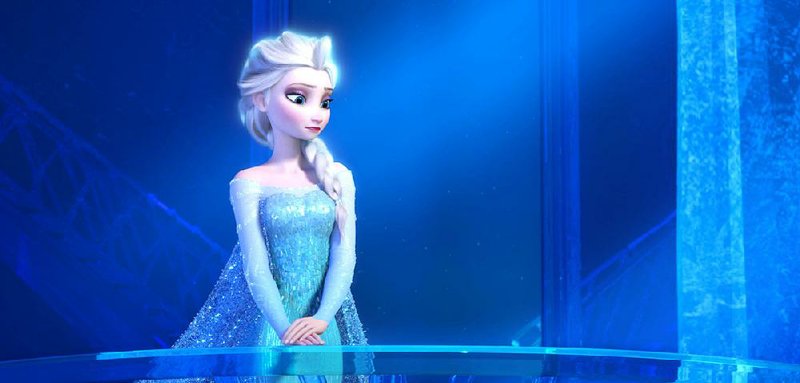To modern eyes, the classic trio of Disney princess films -- released in 1937, 1950, and 1959 -- can seem painfully retrograde. Why are characters so obsessed with Snow White's looks? Why doesn't Cinderella have any talents or hobbies? And why doesn't Sleeping Beauty do anything besides get drugged and await rescue?
A generational gap divides Disney's princess franchise. After 1959's Sleeping Beauty, it took 30 years for the studio to produce another animated princess feature. In the intervening decades came dramatic change. Walt Disney died. Betty Friedan published The Feminine Mystique. Martin Luther King Jr. marched on Washington.
In 1989, when Disney finally released The Little Mermaid, critics praised this modern new heroine. Unlike her predecessors, "Ariel is a fully realized female character who thinks and acts independently, even rebelliously," Roger Ebert wrote. The New York Times called her "a spunky daredevil."
And yet, in one respect, The Little Mermaid represented a backward step in the princess genre. For a film centered on a young woman, there's an awful lot of talking by men.
And it started a trend. The plot of The Little Mermaid, of course, involves Ariel literally losing her voice, but in the five Disney princess movies that followed, the women speak even less. On average in those films, men have three times as many lines as women.
This data comes from linguists Carmen Fought and Karen Eisenhauer, who have been working on a project to analyze all the dialogue from the Disney princess franchise. Since so many girls watch these movies -- often numerous times -- it's worth examining what the films are teaching about gender roles.
"We don't believe that little girls naturally play a certain way or speak a certain way," says Fought, a professor of linguistics at Pitzer College in Claremont, Calif.
The Disney princess research is still in its preliminary stages, but recently, Fought and Eisenhauer gave a preview during the nation's largest conference of linguists. Their goal is to use data to shed light on how the male and female characters in these films talk differently. They started by counting how often the characters spoke. That's when they hit upon a surprising irony.
In the classic three Disney princess films, women speak as much as, or more than the men. Snow White is about 50-50. Cinderella is 60-40. And in Sleeping Beauty, women deliver a whopping 71 percent of the dialogue. Though these were films created more than 50 years ago, they give ample opportunity for women to have their voices heard.
By contrast, all of the princess movies from 1989 to 1999 -- Disney's "Renaissance" era -- are startlingly male-dominated. Men speak 68 percent of the time in The Little Mermaid; 71 percent of the time in Beauty and the Beast; 90 percent of the time in Aladdin; 76 percent of the time in Pocahontas; and 77 percent of the time in Mulan (Mulan herself was counted as a woman, even when she was impersonating a man).
"There's one isolated princess trying to get someone to marry her, but there are no women doing any other things," Fought says. "There are no women leading the townspeople to go against the Beast, no women bonding in the tavern together singing drinking songs, women giving each other directions, or women inventing things. Everybody who's doing anything else, other than finding a husband in the movie, pretty much, is a male."
The older princess films had fewer speaking roles in total, and more gender balance. But The Little Mermaid pioneered a new style of Disney movie, modeled after Broadway musicals, with their large ensemble casts. As the number of characters grew, so did the gender inequality.
"My best guess is that it's carelessness, because we're so trained to think that male is the norm," says Eisenhauer, a doctoral student at North Carolina State in Raleigh. "So when you want to add a shopkeeper, that shopkeeper is a man. ... I think that's just really ingrained in our culture."
The chatty sidekick is another good example of a role that goes to men by default. This is a staple character in more recent Disney films, and he often gets some of the best lines. There's Flounder, Sebastian, Lumiere, Cogsworth, Iago, Genie and Mushu. Why can't any of them be women? Mrs. Potts, the teakettle from Beauty and the Beast, is the only example of a female sidekick, and she's overshadowed by the other castle staff.
After Mulan (1998), Disney took a 10-year break before releasing its next series of princess films. These newer films are better at giving lines to men and women equally. In Tangled, women have 52 percent of the lines, and in Brave, a film about a mother-daughter relationship, they had 74 percent.
Frozen breaks with that trend, though. Despite being a story about two sister princesses, men claim 59 percent of the lines.
It's of course incomplete to judge a film just by the number of words that women say. What the characters say is equally important. So far, Fought and Eisenhauer's analysis has focused on compliments. They have categorized every bit of praise in every Disney princess film to see how the way women are talked about has changed over time.
Here is where the trend is positive. The classic Disney princess films were focused on looks. More than half of the compliments that women received -- 55 percent -- had to do with their appearance. Only 11 percent had to do with their skills or accomplishments. (People could also be complimented for other reasons, like their possessions or their personality.)
The "Renaissance"-era princess films, from the '90s, have a better record in this regard. About 38 percent of the compliments given to women had to do with their looks, while nearly a quarter of the compliments had to do with their abilities or deeds.
Style on 02/02/2016

